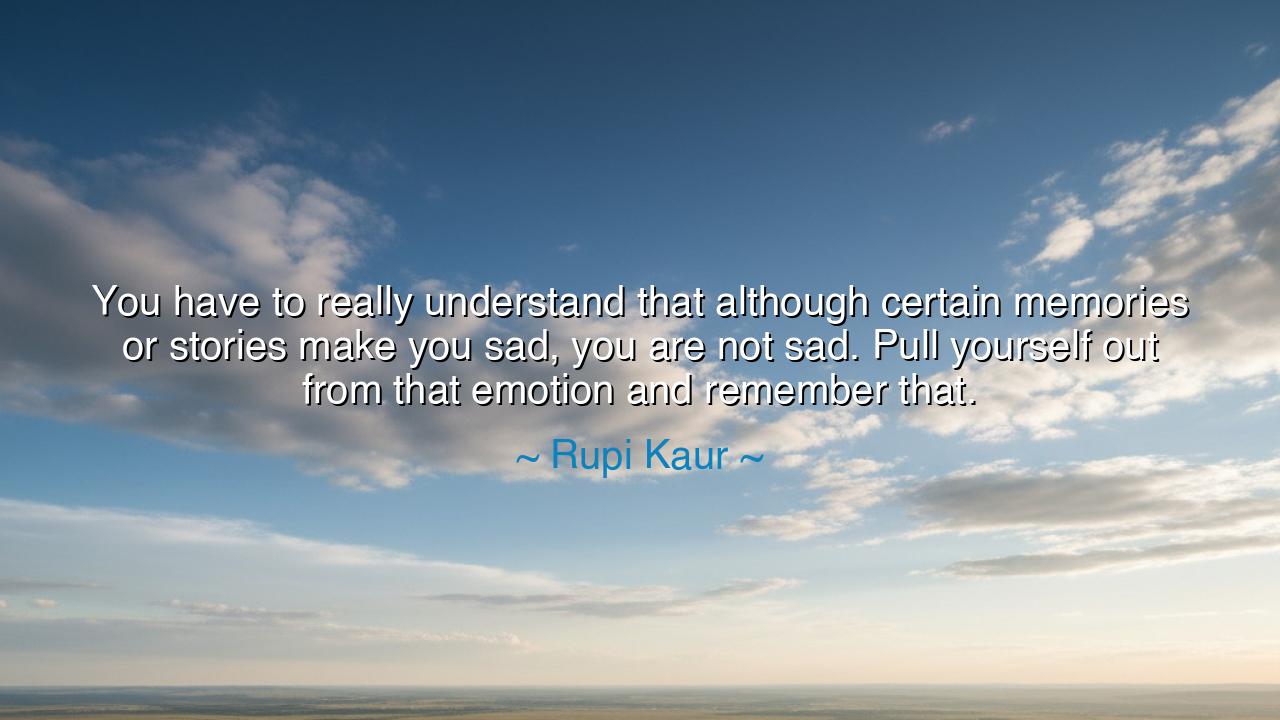
You have to really understand that although certain memories or
You have to really understand that although certain memories or stories make you sad, you are not sad. Pull yourself out from that emotion and remember that.






Rupi Kaur speaks with the voice of one who has wandered through the valleys of grief and returned with a lantern: “You have to really understand that although certain memories or stories make you sad, you are not sad. Pull yourself out from that emotion and remember that.” In these words lies a truth both ancient and liberating—that the soul is not bound forever to the shadows it has passed through. What visits the heart is not the essence of the heart. The storm may rage above the sea, but the depths remain still.
The ancients knew this well. The Stoics, led by Epictetus, taught that we are not disturbed by events themselves but by our judgments about them. A painful memory, a harsh word, a moment of betrayal—these may arise like waves, but it is we who either cling to them or let them pass. Kaur’s wisdom echoes this same teaching: to remember that sadness is not your identity, but only a guest that visits your house for a time. The house itself remains standing, strong and whole.
Consider the life of Nelson Mandela. For twenty-seven years he sat in prison, surrounded by memories of injustice and the weight of sorrow. Yet when he emerged, he did not call himself broken or bitter. He did not allow the emotions of the past to become his permanent self. Instead, he saw them as part of the story, but not the totality of who he was. He pulled himself free from the chains of resentment and chose forgiveness. In this, he showed that while memories may hurt, they need not define.
There is a quiet heroism in this act of separation. To say, “I feel sadness, but I am not sadness,” is to take back power from the past. It is to refuse to be enslaved by old wounds. Too often we mistake passing feelings for permanent truths. We say, “I am broken, I am hopeless, I am lost.” But Kaur’s teaching calls us to rise above such illusions, to recognize that we are not the emotion itself—we are the vastness in which the emotion arises.
This lesson shines also in the life of Helen Keller. Though struck blind and deaf in early childhood, she did not let the sorrow of her condition consume her identity. With the guidance of Anne Sullivan, she discovered that beyond her grief lay a mind ablaze with imagination, a spirit capable of learning and teaching. If Keller had clung only to the story of loss, she would have remained trapped. Instead, she became a symbol of triumph. Her story proves that while stories may shape us, they need not confine us.
And so, the wisdom is clear: emotions are like passing weather, not the sky itself. When memories rise and bring tears, do not deny them, for they are part of your humanity. But do not chain yourself to them either. Remember that behind the clouds there is always a clear sky, untouched and eternal. To pull yourself out from emotion is not to reject feeling, but to remember your true self—a self deeper, stronger, and freer than any single moment of sorrow.
Therefore, let each who hears these words practice this discipline: when sadness comes, breathe and whisper, “This is not me. This is a passing guest.” When old stories surface, honor them, but do not mistake them for your soul. Build daily habits of reflection—through writing, meditation, or prayer—that remind you of your essence beyond emotion. Surround yourself with those who speak life, so that you remember that your story is larger than your grief.
For in the end, this is the gift of Kaur’s words: that you are not your pain, nor your memories, nor your passing storms of feeling. You are more. You are the enduring spirit that witnesses them and remains. Hold to this truth, and you will never be drowned by sorrow, but will rise, again and again, into the light of freedom.






AAdministratorAdministrator
Welcome, honored guests. Please leave a comment, we will respond soon